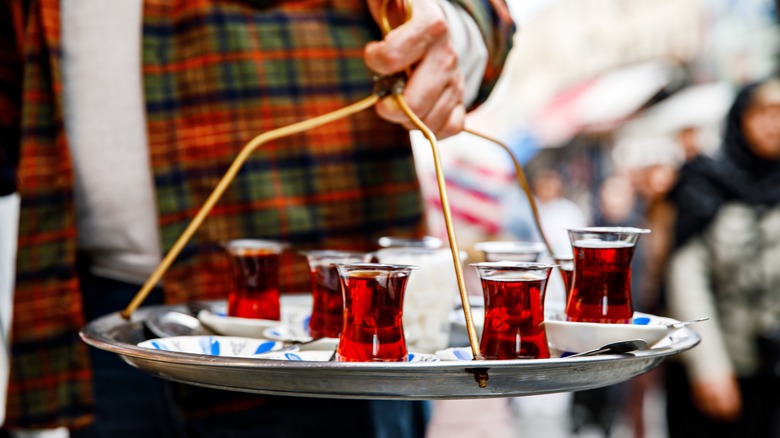Tourists Visiting Turkey Need To Know An Unspoken Tea Rule To Avoid Coming Across As Rude
Traveling to Turkey typically means enjoying the best of both worlds: incredible food and unforgettable experiences. With its bustling market streets, ancient architecture, and storybook-inspired regions, the country is well-known for its rich cultural heritage, spanning centuries.
And while knowing things like how to order food to moderate your spice level and how to dress appropriately while exploring the country are both great ways to embrace local culture and show respect, there's one more thing to keep in mind in order to avoid cultural faux pas: understanding the tea culture. Because, believe it or not, Turkey generally leads the world in tea consumption — with the average person drinking roughly 6.6 pounds of tea every year.
And while you might think of tea as nothing more than a casual morning beverage, the reality is that this simple beverage carries a profound cultural significance. So much so, that even the way you respond to an offer of tea can impact how locals perceive you. That said, if you're looking to be a considerate tourist while visiting Turkey, and want to soak up some authentic Turkish hospitality at the same time, there's one major rule to keep in mind: never say no to a glass of tea (or food, for that matter) when offered.
How tea plays into Turkish hospitality
Known as "çay" — pronounced "chai" — Turkish tea is typically served in special tulip-shaped glasses that highlight its deep reddish-brown color and make it easier to drink, alongside a sugar cube and a selection of small local cookies or pastries. As a nationwide tradition, çay is so ingrained in daily life that you'll find it pretty much everywhere you go — from neighborhood shops to tourist accommodations, and even high-end restaurants. And, unlike coffee, locals drink it throughout the day, no matter the occasion.
From bustling market stalls to family homes, tea plays such a vital role in Turkish society that it's almost ubiquitous with the whole concept of hospitality and socializing among locals. This cultural significance is precisely what makes it so important to understand why refusing to accept a glass of tea from someone can easily be misconstrued as rude or offensive. After all, this seemingly simple gesture represents more than just refreshment — it opens the door to conversation, connection, and friendship.
So whether you're exploring the Grand Bazaar's more than five thousand shops or visiting local sites, it's very likely that shop owners offer you a glass while you browse their store — even if you haven't purchased anything — and that restaurants will serve it complimentary after meals, both of them as a way of welcoming you and showing their appreciation. Better yet, you don't even have to drink the entire glass if you're that full — you can even ask for a glass of water instead — and still remain in their good graces.

